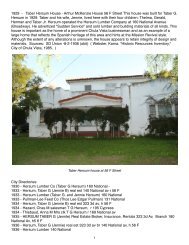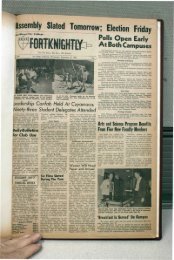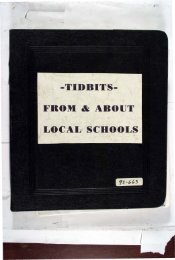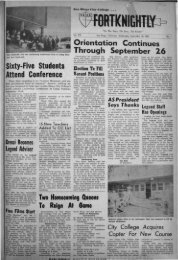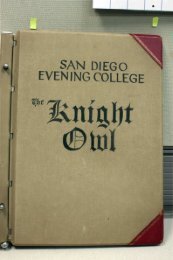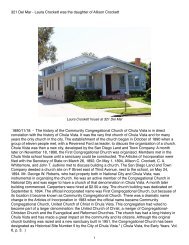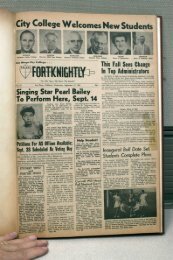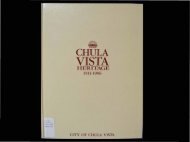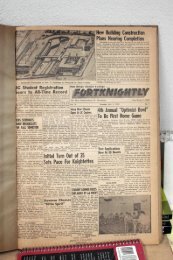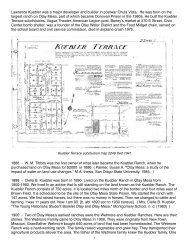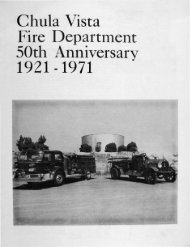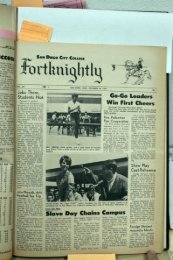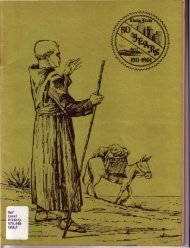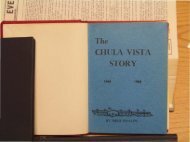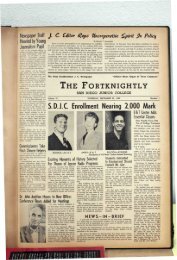doc241 - Schoenherr Home Page in Sunny Chula Vista
doc241 - Schoenherr Home Page in Sunny Chula Vista
doc241 - Schoenherr Home Page in Sunny Chula Vista
Create successful ePaper yourself
Turn your PDF publications into a flip-book with our unique Google optimized e-Paper software.
The different classes of society were quite dist<strong>in</strong>ct <strong>in</strong> the early time, the division<br />
runn<strong>in</strong>g on l<strong>in</strong>es of birth. Natives of Spa<strong>in</strong> or direct descendants of such natives, constituted<br />
the upper class and prided themselves upon the purity of their blood. Aside from<br />
this, they had other and better claims to consideration, for they were usually well educated<br />
and always possessed of considerable culture. In a society accustomed to caste,<br />
they naturally assumed a position of leadership. Some of them were gentlemen <strong>in</strong> reduced<br />
circumstances who had taken to soldier<strong>in</strong>g <strong>in</strong> the hope of retriev<strong>in</strong>g their fortunes.<br />
Others were men of good families who had secured official appo<strong>in</strong>tments. All of them<br />
were proud and dignified <strong>in</strong> bear<strong>in</strong>g, even when they happened to be very poor.<br />
The lower classes consisted, first, of Mexicans with more or less Aztec and Indian<br />
blood, and, last of all, the native Indian. Most of the Mexicans were soldiers, some<br />
of whom brought their wives, while others married Indian women after com<strong>in</strong>g here.<br />
They were a class correspond<strong>in</strong>g to the Spanish peasantry and furnished the labor of<br />
the country.<br />
The social customs which flourished <strong>in</strong> the midst of these conditions were so<br />
deeply marked with the spirit of common k<strong>in</strong>dness that one can hardly escape the<br />
thought that someth<strong>in</strong>g has been lost, as well as ga<strong>in</strong>ed, <strong>in</strong> our present-day struggle to<br />
get ahead, as <strong>in</strong>dividuals and communities. Take, for <strong>in</strong>stance,<br />
<strong>Page</strong> 143<br />
the matter of hospitality to strangers. To offer to pay for enterta<strong>in</strong>ment was an affront.<br />
The traveler was supplied with a fresh horse at every stage of his journey, and had no<br />
care or expense <strong>in</strong> the matter of return<strong>in</strong>g them to their owners. On a table beside his<br />
bed he found a quantity of silver, to which he was expected to help himself, accord<strong>in</strong>g to<br />
his needs, and no questions were asked. If a man needed a bullock, he might send a<br />
vaquero to lasso one from the herd of his wealthy neighbor, and pay for it when<br />
convenient--and if it did not become convenient, it was no matter. If a horse were borrowed<br />
and not returned, it was of no consequence--there were plenty more. The average<br />
of wealth among the cattle owners was large and their bounty was as free as air.<br />
Incivility was absolutely unknown. Even the poorest peasant saluted you politely<br />
and was prepared to carry a message or do any little courtesy without charge and with<br />
an air of cheerfulness and good humor. The k<strong>in</strong>dness of the people was genu<strong>in</strong>e and<br />
unaffected. It was the custom to call all persons by their Christian names, with an easy<br />
familiarity. Older men received the prefix of Don or Señor Don, and ladies of Doña or<br />
Señorita Doña, if unmarried, and Señora Doña, if married. It was also quite usual to<br />
playfully nickname one's <strong>in</strong>timate friends <strong>in</strong> a humorous manner to which the Spanish<br />
language lends itself most happily. For <strong>in</strong>stance, Wm. A. Gale was known as Quatro<br />
Ojos (four eyes), on account of his wear<strong>in</strong>g glasses. He was also called Tormenta<br />
(gale), and (Cambalache (barter); both for obvious reasons.<br />
One of the most remarkable characteristics of the Californians was the very great<br />
respect shown to parents by their children. This deference was not abandoned with the<br />
pass<strong>in</strong>g years, but even a grown man com<strong>in</strong>g <strong>in</strong>to the presence of his father or mother<br />
always removed his hat and rema<strong>in</strong>ed stand<strong>in</strong>g until <strong>in</strong>vited to sit. No man, whatever his<br />
age, ever smoked <strong>in</strong> the presence of his father or mother. If a young man met an elder<br />
<strong>in</strong> the street, he would throw away his cigar and lift his hat, whether to his parents or a<br />
stranger. Servants showed the same deference to their employers. One scarcely knows<br />
what to say about the current stories of old men chastis<strong>in</strong>g their grown sons and the lat-



